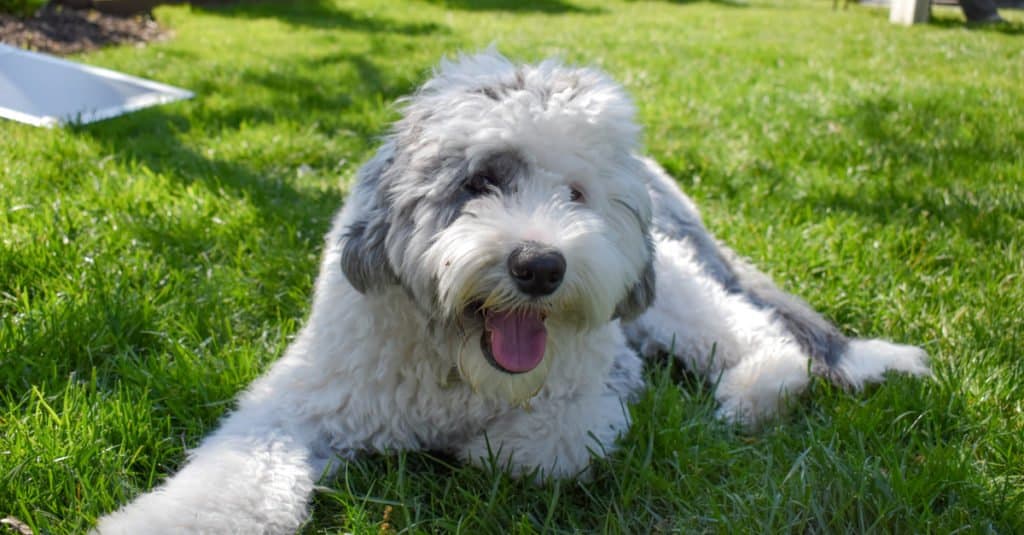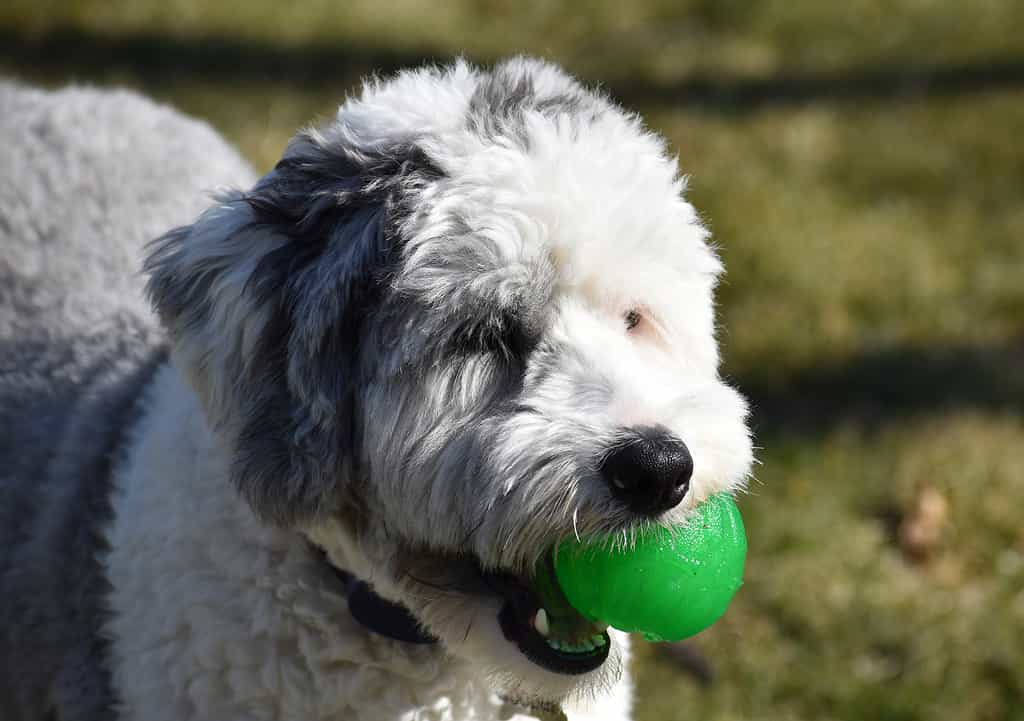Sheepadoodle Lifespan: How Long They Typically Live 5 Common Health Problems
The lifespan of a Sheepadoodle, or of any dog, for that matter, is of paramount importance. The choice of a dog companion always comes with a caveat and this one, unfortunately, is the understanding that you and your family will most likely outlive the dog.
Even a dog with the longest lifespan can only approach a quarter of a century. A Sheepadoodle, as its name implies, is a hybrid mix of old English sheepdog and poodle. The good news is that most non-purebred dogs tend to live longer than their purebred counterparts and the Sheepadoodle is no exception.
The American Animal Hospital Association is responsible for the latest information on the lifespan of a mix breed versus a pure breed, and the data is pretty clear. As a hybrid, however, the Sheepadoodle has a comparative lifespan with its progenitors, poodles and sheepdogs.
Lifespan Of A Sheepadoodle
The lifespan of a Sheepadoodle is typically between 12 and 15 years. As an average lifespan, there are a number of variables that change things for the better or for the worse. Sheepadoodles already have a positive factor in their favor. Both sheepdogs and poodles have the same average lifespan of 12 to 15 years.
They don’t have to worry about poor health issues and short lives in their ancestry. On the downside, some health issues specific to poodles and sheepdogs, along with both of their vulnerabilities, are present in sheepadoodles.
Can you extend the lifespan of a Sheepadoodle? For the most part, 12 to 15 year is the best you’ll get. However, there are many things you can do that will determine whether or not your Sheepadoodle has a healthy and happy lifestyle, getting the most out of the breed’s lifespan.
The Sheepadoodle has a very friendly nature, with a touch of the working dog mentality and the happy, energetic nature of a poodle. While they seem like pretty calm dogs, they are active, requiring daily exercise, a healthy dose of training and playtime, and plenty of positive attention.
Both poodles and sheepdogs are highly intelligent canines, and the Sheepadoodle inherited those smarts as well. For that reason, mental exercise is every bit as important as physical exercise.
Maximizing The Lifespan Of A Sheepadoodle

©Lisa Mounteer/Shutterstock.com
While sheepadoodles are though of as long-lived dogs, smaller breeds tend to live longer than larger breeds. Sheepadoodles are large dogs, though they lack the size and girth of cane corsos, other mastiff breeds, and great Danes.
The Importance of Diet
As a larger dog, sheepadoodles won’t live as long as their miniature or toy poodle cousins. Smaller dogs generally live longer than larger dogs. You can minimize the impact of this by maintaining a healthy diet and size in your Sheepadoodle.
Between males and females, 65 to 85 lbs is the limit, and you should ensure that your Sheepadoodle doesn’t go beyond the max or below the minimum. A healthy diet does much to minimize the perils of weighing too much or too little and will also affect your Sheepadoodle’s mental well-being.
Be Careful Who You Buy From
Make sure you only purchase a Sheepadoodle from a reputable breeder. There are so many backyard breeders out there, some of whom are popular within their local communities, that it’s easy to get caught up in it. Yes, it’s much more expensive. However, it’s better to spend the money on a reputable breeder with extensive DNA and genetic testing in their toolkit than end up with an unhealthy Sheepadoodle.
Maintain Physical And Mental Exercise
So far, none of these tips are intrinsic to the Sheepadoodle. However, they are intrinsic to dogs in general. What works for one dog, works for all dogs. One such tip is the regular inclusion of mental and physical stimulation. A Sheepadoodle is an active and energetic dog, so it needs plenty of attention, play time, and outdoor exercise.
It’s definitely not the best canine choice for apartment living, when you’ll be gone working a regular 9 -5. It’s proven through countless studies that exercise promotes a healthy, long life in dogs and there is nothing different when it comes to Sheepadoodles.
Study Their Ancestry
This sort of plays along with choosing the right breeder. The lifespan of a Sheepadoodle is dependent on more than just diet and lifestyle. Generational health issues matter as well, and any reputable breeder will have an ancestry timeline for you to go over.
For instance, how do you know that the Sheepadoodle you’re looking at is a 50/50 between a poodle and a sheepdog? There are plenty of sheepadoodles out there with one Sheepadoodle parent and one poodle parent, or vice versa. This creates a number of generational combinations that result in a Sheepadoodle.
Why is this important to know? The genetic health issues prevalent in either a sheepdog or a poodle are more common in a Sheepadoodle, depending on those percentages. Another example is a first generation, back cross Sheepadoodle, which is the result of a first generation Sheepadoodle parent bred with a pure poodle. A second generation back cross results in a 1/3 to 2/3 ratio.
It’s not enough to just know the pedigree for the sake of knowing. This knowledge provides you with an informed, bird’s-eye view of the generational health concerns you should be on the lookout for.
Lifespan Of A Sheepadoodle In Stages

©Logan Swenson/Shutterstock.com
We are all familiar with the life calculator for dogs—each one year of doggy life is equal to 7 years of human life. This isn’t an accurate scale, but it does offer an ideal lifespan chart, presented in the form of an average. Sheepadoodles, like all other dogs and cats, have four life stages.
The puppy stage for a Sheepadoodle is the first 6 months of their life. After the puppy stage, they enter their juvenile period, or adolescence. This period lasts from the 6-month point to a year and a half of life. From that point on, Sheepadoodles are adults until they reach 10 years of age.
At 10 , your Sheepadoodle is a senior dog. So long as there are no health issues up to this point, expect another 2 to 5 years of life before old age finally catches up.
5 Common Health Problems That Affect The Lifespan Of A Sheepadoodle
All dogs have common health problems, but many of these issues are specific to certain breeds. Sheepadoodles are a generation removed from purebred canines, give or take some of the stranger generational ratios given above. This means that while they are more impervious to specific diseases than their parents are, they are more susceptible than mixed breed dogs.
1. Cushing’s Disease

©Logan Swenson/iStock via Getty Images
Sheepadoodles get this from the poodle side of their ancestry. Poodles, like dachshunds and terriers, are more prone to Cushing’s disease than most other canines, and they pass this genetic predisposition on to Sheepadoodles. This is why the above discussion over generational attributes is important. If you purchase a Sheepadoodle with 25% poodle lineage, Cushing’s may not be as much of an issue.
However, it also depends on how prevalent Cushing’s disease is within the poodle ancestry side of Sheepadoodle’s family tree. Cushing’s disease is a simpler term for a hyperadrenocorticism disorder. Since poodles are prone to getting the pituitary form of this disease, and not the adrenal, this is the form you may have to deal with in your Sheepadoodle.
2. Addison’s Disease

©Wirestock/iStock via Getty Images
Addison’s disease is similar to Cushing’s in that it affects the cortisone production efficiency in dogs. While Cushing’s produces too much cortisol, Addison’s does the exact opposite, with an underproduction of cortisol. Female Sheepadoodles are more prone to the disease than males, and it usually presents itself in the adult stage of life.
3. Joint Issues (Hip Dysplasia)

©Sydney Jones/Shutterstock.com
Any time you get a dog that’s larger than medium size, you run into issues like this one. It’s especially bad in really big or really long dogs. Sheepadoodles tend to suffer from hip dysplasia, as well as a healthy dose of elbow dysplasia. Since this is an abnormality in the growth of the hip or elbow, it may present itself early on in the dog’s life.
However, if it’s only a slight deformity, then you may not notice it until the dog reaches its senior years and starts slowing down. Hip dysplasia is the source of the problem, but not necessarily the problem that sends you to the vet. Hip and elbow dysplasia creates a deformity, and that deformity tends to take effect further down the road.
For instance, as your dog ages, the earlier deformation of the hip’s ball and socket will result in osteoporosis, when the dog otherwise wouldn’t have osteoporosis. Hip or joint dysplasia is also responsible for the development and exacerbation of degenerative joint disease (DJD).
Dealing with hip or elbow dysplasia comes with its own difficulties. However, its necessary for increasing the lifespan of your sheepadoodle, as well as providing a comfortable life.
4. Heart Issues

©Jason Grant/Shutterstock.com
This is the one that bothers dog owners the most, due to the fact that signs of heart disease often run parallel to a dog entering their senior years. Signs of lethargy and decreases in physical activity are often attributed to the dog’s age, when the real culprit may be heart disease.
From their sheepdog forefathers and mothers, Sheepadoodles get tricuspid valve dysplasia and atrial septal defects. The former is a deformation of the heart, while the latter is a literal hole in the heart, neither of which are caused by heart worms. Neither is a certain predictor for the lifespan of a sheepadoodle, though both may be dangerous in later years.
Sheepadoodles don’t receive a heart health issue from their poodle parentage, so there’s a bright side to look at as well.
5. Skin Problems

©SoySendra/Shutterstock.com
From their poodle parentage, Sheepadoodles may inherit sebaceous adenitis, which is an inflammatory skin condition. Since it’s a microbial problem, anti-microbial shampoos, conditioners, and medications are necessary to alleviate it. Untreated, sebaceous adenitis will lead to flaky skin, intense itching, patchy hair loss, and eventual lesions on the body.
Final Thoughts
The good news is, the lifespan of a Sheepadoodle is rarely dictated by disease. Overall, Sheepadoodles are hearty animals that live a long and healthy life. The diseases that are severely detrimental to them are generally hereditary. This is why its highly incumbent upon you to do your homework when you select a breeder. Make sure you have an extensive family tree to look at, not one that was created yesterday and only has one generation to look at.
Otherwise, enjoy you time with your Sheepadoodle. As smart, energetic dogs, they require a generally active and mentall engaging lifestyle. Give them both. Provide them with a healthy diet. Keep up with trips to the vet for their routine checkups. Do all of these things, and you will get the most out of your 12 to 15 years.
The photo featured at the top of this post is © Logan Swenson/iStock via Getty Images









